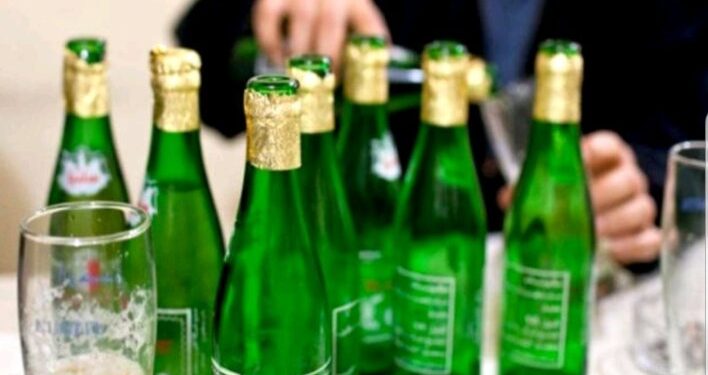In Tunisia, a country with a rich ancient wine legacy, alcohol consumption reveals a deep paradox between historical tradition and religious taboos. Despite the prohibitions, alcohol is still flowing in alleys as in tourist hotels, testifying to a complex and contrasting reality. Back on the millennial roots and the tourist opening that shaped this ambivalent relationship.
According to recent data from the World Health Organization (WHO), Tunisia has an average consumption of about 12.8 liters of pure alcohol per adult and per year. This figure places the country at the top of the Arab world And 9ᵉ in the world. A surprising statistic in a Muslim majority country, where alcohol remains officially prohibited by religion and supervised by law.
A social and psychological escape
However, an investigation carried out by the Pew Research Center revealed in 2013 that more than 80 % of Tunisians disapprove of alcohol consumption. This contradiction between discourse and practices illustrates a paradox deeply rooted in society.
In Tunisia, the sale of alcohol is strictly regulated: prohibited to Muslims (in theory) according to the penal code, suspended during the month of Ramadan, on Fridays and the days of religious holidays. But these legal restrictions do not actually hinder access to alcoholic beverages. This official rarity nourishes a flourishing black marketwhich feeds both regular consumers and occasional buyers.
In authorized bars and points of sale, high taxation of drinks pushes part of consumers to cheaper products and often of poor quality, thus increasing health risks.
For many Tunisians, alcohol becomes an outlet in the face of economic and social pressures. The years that followed the 2011 revolution saw a form of collective anxiety grow, translated in some by increased consumption.
Read :: Fight against driving: Tunisia deploys new generation blood pressure ones
Young people, especially in major cities, also see it as a means of disinhibition In an environment where other forms of entertainment are limited. This phenomenon is accompanied by a progressive trivialization of alcohol in certain urban areas, despite religious and family norms.
Alcohol taxes have increased sharply in recent years, making certain drinks up to twice as expensive in 2010. However, demand is not weakening. It moves to affordable alternatives, often artisanal or smuggling, which escape any health control.
Medical and social associations regularly sound the alarm in the face of the increase in poisoning and alcohol -related violence, but their calls are struggling to find an echo in public policies.
Ancient roots with tourist boom
The relationship of Tunisia with alcohol goes back well before the modern era. From Antiquitythe region was known for its vineyards, especially under the influence of the Phoenicians and the Carthaginians. The illustrious Carthaginian agronomist Magseauthor of a treaty on viticulture, had laid the basics of techniques which were going to influence wine production throughout the Mediterranean basin. The Romans, heirs to these know-how, still developed the culture of the vine, exporting wines and amphorae from the ports of Carthage, Dougga or Thuburbo Majus.
Over the centuries, the Arab conquest and the Islamization of the region have slowed down this tradition, without however completely erasing it. The production of wine and beer has continued in a marginal way, especially in areas with a strong European presence or within non -Muslim communities.
Contemporary era has seen a Renaissance of this wine and brewing cultureespecially from the French protectorate (1881-1956) and, more recently, with tourist boom. In the 1970s and 1980s, the development of seaside zones and the opening to international tourism led to a more visible alcohol offer in hotels, restaurants and tourist complexes.
This opening policy was aimed at meeting the expectations of foreign visitors, making a market for non-Muslims and local consumption coexisting which, although taboo, continued to grow on the sidelines of official circuits.
Regarding the consumption of alcohol, according to the Dr Faten Driss, specialist in addiction treatment, Dependence should be considered a disease, not an offense. She insists on the importance of lifting stigma, especially within families, who must support with listening, understanding and support, and not judgment or repression. Treatment requires patience, time and regular monitoring in therapy, often without hospitalization. The center of Jebel Ouest, unique in Tunisia, mainly supports post-consumption social reintegration. Dr Driss recalls that addiction is a chronic brain disease with permanent risk of relapse. It calls for the benevolence of relatives in the face of relapses, stressing that healing remains possible thanks to constant support.
A paradox that questions
However, Tunisia lives in a form of Cultural schizophrenia : on the one hand, an official and religious speech which firmly condemns alcohol; on the other, real consumption that competes with that of many Western countries.
This paradox, maintained by the weight of the taboo, the lack of prevention and social tensions, continues to shape the relationship of Tunisians to alcohol – a relationship that is both hidden, tolerated and difficult to break.








